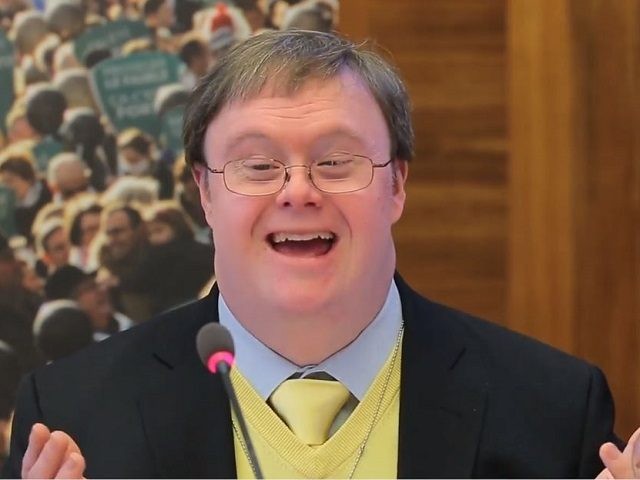John Franklin Stephens, a man with Down syndrome, told the United Nations that a world without people like him would be “a poorer world, a colder world, a less happy world.”
In a moving speech before the 37th session of the Human Rights Council last week, Mr. Stephens told his audience that the most important thing that can be done to improve the lives of people with Down syndrome is to remember their status as human beings, equal in dignity to everyone else.
“I am a man,” Stephens said. “See me as a human being, not a birth defect, not a syndrome. I don’t need to be eradicated. I don’t need to be cured. I need to be loved, valued, educated and, sometimes, helped.”
Mr. Stephens was invited to speak at the U.N. days before the celebration of World Down Syndrome Day 2018, to be held on March 21.
Ironically, his address came the day after an Ohio judge sided with the abortion industry and blocked a law that banned selective abortions targeting babies diagnosed with Down syndrome.
“Federal law is crystal clear,” wrote Obama-appointee Judge Timothy S. Black of the U.S. District Court for Southern Ohio in a 22-page ruling granting a preliminary injunction against the state.
Black wrote that the Ohio law “wrongfully” prohibits women from making the ultimate decision to terminate a pregnancy before viability. “It violates the right to privacy of every woman in Ohio and is unconstitutional on its face,” he added.
Ohio Gov. John Kasich signed the “Down Syndrome Non-Discrimination Act” into law last December, banning selective abortions performed on babies diagnosed with Trisomy 21, or Down syndrome.
In his speech before the U.N., Mr. Stephens brought up the uncomfortable comparison between aborting people with Down syndrome and other eugenic programs of the past.
“How would the world react if a nation proclaimed that it would use genomic testing to make itself ‘Unpopular ethnic minority free’ by 2030?” he asked. “The U.N. has a name for this, but we need not go there.”
“Instead,” he said, “let us pledge together to welcome diversity.”
“Let us decide from this day forward to include, not exclude; educate, not isolate; and, celebrate, not terminate.”
Despite the sober content of his talk, Mr. Stephens made room for humor as well.
“People like me tend to be a little shorter because our arms and legs and shorter. Our faces are a little bit flatter because our cheekbones and noses don’t stick out from our faces as much,” he said. “All that adds up to a person who is a little bit uncommon, in my case, uncommonly handsome.”
“Don’t worry, I am very accepting, very inclusive,” he continued. “I won’t think less of you just because I have more chromosomes than you do.”
Stephens insisted that “a life with Down syndrome can be as full and exciting as any other,” using his own life as an example.
He also thanked the Lejeune Foundation and Special Olympics for “freeing us from the prison of neglect,” saying that his generation owes such organizations “an awesome debt.”
“I truly believe a world without people like me would be a poorer world, a colder world, a less happy world,” he said.
To skeptics, Stephens pointed out the particular benefits provided by persons with Down syndrome to society at large.
First, the extra chromosome present in persons with Down syndrome “makes us a blueprint for medical research in areas that include soft tissue cancer, heart disease, immune system disorders, and Alzheimer’s disease,” he said.
In the second place, Stephens referenced a Harvard-based study that discovered that “people with Down syndrome, their parents, their siblings, and the people close to them are all happier than society at large” and therefore generate happiness for the world.
They are also a reminder, he noted, of the dangers of eugenics and where it can lead. “Genomic research is not going to stop at screening for Down syndrome,” he warned. “We have an opportunity right now to slow down and think about the ethics of deciding that certain humans do not get a chance at life.”
Watch the full speech here.
Follow Thomas D. Williams on Twitter Follow @tdwilliamsrome

COMMENTS
Please let us know if you're having issues with commenting.